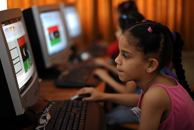Cyberspace is blurring geographical boundaries and breaking cultural divides. It brings families and friends closer together and builds knowledge and understanding between communities and nations.

The internet is educating whole generations, giving many a better future by granting rapid access to information and ideas. It is enabling ordinary citizens to hold their governments to account, supporting democratic change and improving the lives of millions. New technology offers the opportunity to improve the provision of public services as well as the response to emergencies and natural disasters.
It’s clear that the social and economic benefits of a networked world can be enormous, particularly for developing countries. It is already making a difference for them - from educating rural communities in Burkino Faso to enabling the remote monitoring of HIV patients in South Africa.
The issues that the conference delegates will address will include:
- The opportunities for governments to engage with citizens and provide services via the Internet, including through delivery of services, what are the obstacles and how can they be overcome
- Protection of individuals online and their personal information
- The application of international human rights norms in cyberspace
- The priorities for capacity building assistance to developing countries.